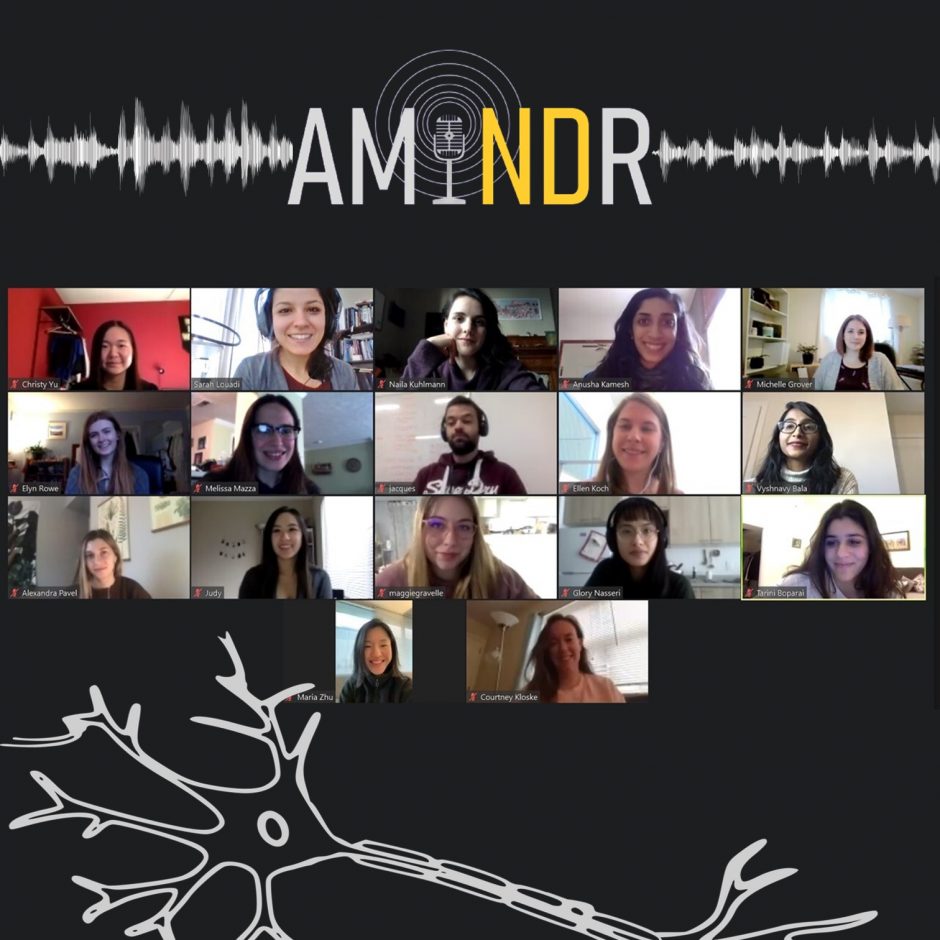By: Sarah Louadi, UBC MD Class of 2024.
What is AMiNDR (a brief introduction)?
AMiNDR is an open-access knowledge dissemination tool for researchers and clinicians who are interested in neurodegenerative diseases. We present the abstracts published on Alzheimer’s disease by category in an audio format to help scientists keep up with the new literature in the field in a more convenient manner. Our team consists of over 25 volunteers from 6 different countries, who are passionate about science communication. Together we work on categorising, summarising and presenting these abstracts then editing and producing packaged episodes with accompanying bibliographies.
The bibliographies are generated for all the topics, regardless of whether they are covered in the podcast. They are useful tools for those who need a list of papers in a specific topic for a literature review.
What motivated you and your team to start this project?
Many of us are or were graduate students who experienced the pain of parsing through hundreds of papers and found it difficult to keep up with the ever-growing literature. There are over 1000 papers published on Alzheimer’s disease alone! How can one keep up with this literature while also attending classes, designing and conducting experiments, analysing data, writing papers, teaching classes, grading papers, attending meetings? And the list goes on and on for students! Something has got to give, and reading is often put on the back burner. We felt the need for a tool that streamlined all new information and helped keep us up-to date with the evolving literature. We looked and could not find such a tool, so we created the podcast that we wished we had for ourselves.
Why podcasts over other means of communication?
Podcasts are becoming increasingly popular, and how could they not be? They are accessible anywhere for anyone who owns a smartphone and headphones, and they can be accessed anywhere such as on the bus, at the gym, or even at home while doing chores and cooking. Podcasts present an opportunity for trainees to optimise their time and multitask. For example, how about catching up with the news on risk factors for Alzheimer’s disease while organising spreadsheets for data analysis?
In addition, the audio format offers an alternative to electronic screens. Thanks to our podcast, one does not need to sit at a desk or stare at their screen to catch up on the latest research findings on Alzheimer’s disease.
Why should medical students and trainees listen to the AMiNDR podcasts?
We understand that medical students and trainees are very busy, so keeping up with the primary literature may not be at the top of their priorities. With our podcast, let us help you integrate this practice into your morning run, your transit time, or your meal prep routine.
Our podcast is a convenient tool for anyone with a background in Neuroscience and an interest in advancements in Alzheimer’s disease research. This is a niche area, and admittedly, the podcast is not accessible to a lay audience. It was catered specifically to help neuroscientists, and we trust that medical students and trainees with an interest in neurology and geriatrics will find it useful.
This podcast is also a great tool for your FLEX project if you are focusing on Alzheimer’s disease or dementia. Find your list of papers for your literature review in our bibliographies with only a few clicks, and get summaries from the past 1.5 years in our podcasts presented by graduate students who actively work on this, some with many years of experience in the field!
Our episodes span 4 major categories: disease mechanisms, risk factors and prevention, diagnostic tools, and treatment development. These categories are then further split by topic and target, and these subcategories shape the episodes. For example, you will find episodes on brain imaging and clinical testing (which are easily identified by the title).
Our team consists of a diverse mix of medical students, graduate students, and postdoctoral fellows, and we dig from our own experience and feedback from listeners to adapt our scripts. We often precede our summaries with a little background into the topic or a concept introduced in the abstracts, so that listeners are eased through the episode the way they would be in a lecture.
You can learn more about us by following us on Instagram, Twitter, Facebook, and LinkedIn. Our episodes are available wherever you listen to Podcasts or directly on our site: https://amindr.com/
In addition to the service we offer, this has been a great opportunity for our team members to grow their science communication and knowledge translation skills, and we welcome anyone with a genuine interest in facilitating the dissemination of new findings in Neuroscience. If this is you, don’t hesitate to reach out at amindrpodcast@gmail.com
